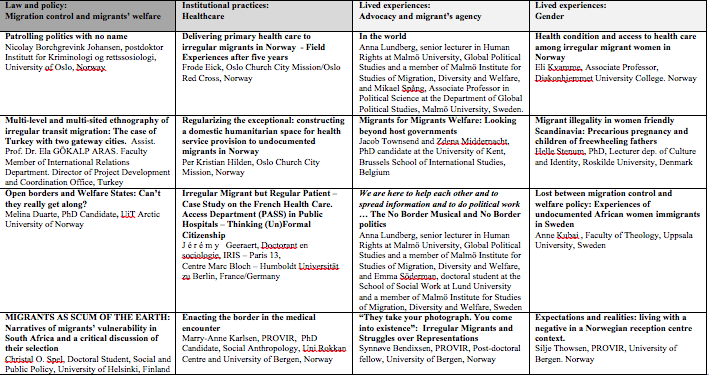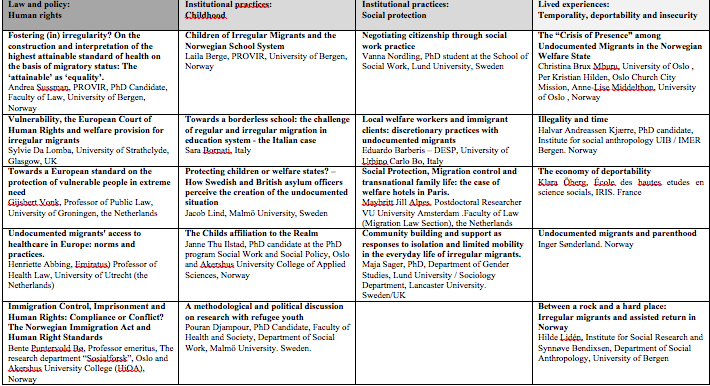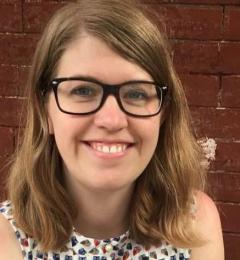Halvar A. Kjærre: “Politics and Mobilities”
Tarje I. Wanvik: “Migration and Social Inequalities”
Halvar A. Kjærre (Department of Social Anthropology, UiB) and Tarje I. Wanvik (Department of Geography, UiB) have recently been recruited to the IMER Bergen research unit as PhD candidates.
In this seminar they will present their PhD projects. After the presentation there will also be a presentation of IMERS new webpages.
Closing conference PROVIR
“Exceptional welfare: Dilemmas in/of irregular migration”
How do states respond to the physical presence and needs of people it officially has excluded? To what extent do international human rights provide protection? How does migration control and welfare policy affect irregular migrants’ experiences and subjectivities?
Physically present, but legally excluded, irregular migrants’ present societies with particular dilemmas relating to both sovereignty and human suffering. European countries increasingly involve welfare services in migration control, either by restricting access, or by using welfare services to detect/expose irregular migrants. This raises important questions concerning not only how migrants’ legal status influences their capacity to access services, but also the practical and ethical implications for service providers. Furthermore, it challenges the extent to which human rights actually limit the exclusionary powers of states and as such whether human rights are viable outside the confines of citizenship.
Provision of Welfare to Irregular Migrants (PROVIR) will be organizing its closing conference at the University of Bergen, 19th – 21th of November 2014. As an interdisciplinary project, the PROVIR research group and its international partners have combined a legal and social science approach to the provision of welfare to ‘irregular migrants’ in Norway, and comparatively in Europe, looking particularly at health care and education. The aim of the project has been to investigate the complex relationship between law, institutional practice, and migrants’ lived experience.
The closing conference aims to bring together researchers from various disciplines who are interested in the interplay between migration control and welfare policy. At the conference, findings from the PROVIR-project will be presented by the research team. In addition to presentations by key note speakers, the PROVIR research team also welcomes papers to be presented at workshops. We especially invite contributions addressing:
1) Irregular migrants’ legal situation regarding access to welfare provisions, either in national or international law.
2) Institutional practices and responses by service providers.
3) Migrants’ experiences, agency and embodiment.
We welcome both theoretical and empirical ventures into these questions, and papers may combine the aforementioned issues with interdisciplinary approaches. We particularly encourage papers exploring issues related to health, education and children. Paper proposals (maximum 300 words) can be submitted until the 25th of April 2014. Please include a short bio with the abstract. Conference registration deadline is 1st of October.
More information about the PROVIR-project is available at http://rokkan.uni.no/sites/provir/
PROVIR closing conference: Registration deadline 01.10.2014:
Conference registration deadline is 1st of October. Send abstract and registration details to Marry-Anne.Karlsen@uni.noMore information about the PROVIR-project is available at http://rokkan.uni.no/sites/provir/ To register and pay registration fee, please use the following link: https://provir.hoopla.no/sales/#1609368930/
Closing conference PROVIR: “Exceptional welfare: Dilemmas in/of irregular migration”
How do states respond to the physical presence and needs of people it officially has excluded? To what extent do international human rights provide protection? How does migration control and welfare policy affect irregular migrants’ experiences and subjectivities?Physically present, but legally excluded, irregular migrants’ present societies with particular dilemmas relating to both sovereignty and human suffering. European countries increasingly involve welfare services in migration control, either by restricting access, or by using welfare services to detect/expose irregular migrants. This raises important questions concerning not only how migrants’ legal status influences their capacity to access services, but also the practical and ethical implications for service providers. Furthermore, it challenges the extent to which human rights actually limit the exclusionary powers of states and as such whether human rights are viable outside the confines of citizenship.
Provision of Welfare to Irregular Migrants (PROVIR) will be organizing its closing conference at the University of Bergen, 19th – 21th of November 2014. As an interdisciplinary project, the PROVIR research group and its international partners have combined a legal and social science approach to the provision of welfare to ‘irregular migrants’ in Norway, and comparatively in Europe, looking particularly at health care and education. The aim of the project has been to investigate the complex relationship between law, institutional practice, and migrants’ lived experience.
The closing conference aims to bring together researchers from various disciplines who are interested in the interplay between migration control and welfare policy. At the conference, findings from the PROVIR-project will be presented by the research team. In addition to presentations by key note speakers, the PROVIR research team also welcomes papers to be presented at workshops. The topics adressed will be:
- Irregular migrants’ legal situation regarding access to welfare provisions, either in national or international law.
- Institutional practices and responses by service providers.
- Migrants’ experiences, agency and embodiment.
PROGRAM:
Wednesday 19th of November Venue: Det Akademiske Kvarter
18.00-19.30: Letter to the king Film by Hisham Zaman
Letter to the King portrays five people on a day trip from a refugee camp to Oslo, a welcome change in an otherwise monotonous life. But we soon realize that each and every one of them has an agenda for their trip. All five will make decisive choices on this day, as they discover happiness, humiliation, love or fulfill a long-awaited revenge. The five stories are tied together by a letter, written by eighty-three year old Mirza. Mirza wants to hand over the letter to the King personally.
19.30-21.00: Mediating irregular migration
The phenomenon of irregular migration is inextricably linked to its forms of mediation. Researchers, artists, authors, journalists and others contribute to the proliferation of images of the lives, and deaths, of those who migrate without proper authorization from the state. While stereotypical accounts of victims/criminals proliferate in mainstream media – (counter) representations that challenge such stereotyping also exist. The speakers in this panel discussion have all participated in producing and/or analysing images of irregular migration. Taking as their point of departure the film “Letter to the King”, they will discuss the poetics and politics of mediating irregular migration. What (im)possibilities does such mediation offer for current border struggles?
Plenary panel discussion with:
Hisham Zaman, Director (To be confirmed)
Shahram Khosravi, Associate Professor of Social Anthropology, University of Stockholm
Synnøve N. Bendixsen, Post-doctoral fellow PROVIR and Department of Social Anthropology, University of Bergen
Film and panel discussion organized in cooperation with Studentersamfunnet i Bergen (http://samfunnet.sib.no/)
Thursday 20th of November Venue: Faculty of Law, Magnus Lagabøtes plass 1, University of Bergen
09.30-10.00: Tea, coffee and registrations
10.00-10.15: Welcome address
10.15-11.45: Precarious inclusion: Provision of welfare to irregular migrants in Norway
Presentation of PROVIR research findings by
Christine M. Jacobsen, Karl Harald Søvig, Synnøve Bendixsen, Andrea Sussman and Marry-Anne Karlsen
11.45-12.00: Coffee break
12.00-13.00: Care Beyond Welfare?
Key note lecture by Miriam Ticktin, Associate Professor of Anthropology, The New School for Social Research and Eugene Lang College (US)
13.00-14.00: Lunch
14.00-16.00: Workshops
16.00-16.15: Coffee break
16.15-17.15: Wrongs, Rights and Regularization
Key note lecture by Linda Bosniak, Distinguished Professor of Law, Rutgers School of Law–Camden (US)
19.00: Conference dinner
Nøsteboden
Friday 21st of November
Venue: Faculty of Law, Magnus Lagabøtes plass 1, University of Bergen
09.15-10.15: Limiting Health Care as a Tool of Immigration Policy: Ethnographic Insights into Deservingness and Responses by Civil Society
Key note lecture by Heide Castañeda, Associate Professor and Graduate Director, Department of Anthropology, University of South Florida (US)
10.15-10.30: Coffee break
10.30-13.00: Workshops
13.00-14.00: Lunch
14.00-16.00: Excepted, excluded or precariously included? Dilemmas in/of irregular migration Roundtable discussion by PROVIR research team and international partners:
Bridget Anderson, Professor of Migration and Citizenship and Deputy Director of Centre on Migration, Policy and Society (COMPAS), University of Oxford (UK)
Milena Chimienti, Professor, University of Applied Science Western Switzerland – Social Work, Haute Ecole Fribourgeoise de Travail Social (HETS) (Switzerland)
Henriette Abbing, (Emiratus) Professor of Health Law, University of Utrecht (the Netherlands)
Christine M. Jacobsen, Professor, PROVIR project leader and Director of Center for Women’s and Gender Research (SKOK), University of Bergen (Norway)
Karl Harald Søvig, Professor, Faculty of Law, University of Bergen (Norway)
Workshop Porgram:
Download workshop program here
Redigert av Christine Jacobsen, Synnøve Bendixsen, Karl Harald Søvig
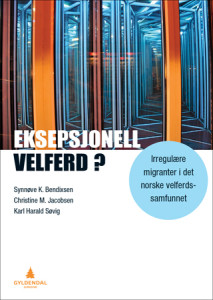 Irregulære immigranter har på noen områder full tilgang til velferdsytelser, men på mange områder er tilgangen svært begrenset enten i form av rettsregler eller andre barrierer. Denne antologien undersøker forholdet mellom rettslig rammeverk, institusjonell praksis og hvordan irregulære migranter selv erfarer sin situasjon.
Irregulære immigranter har på noen områder full tilgang til velferdsytelser, men på mange områder er tilgangen svært begrenset enten i form av rettsregler eller andre barrierer. Denne antologien undersøker forholdet mellom rettslig rammeverk, institusjonell praksis og hvordan irregulære migranter selv erfarer sin situasjon. Med en unik kombinasjon av juridisk og antropologisk blikk, går boken regelverket nærmere i sømmene, drøfter gatebyråkraters utfordringer og hverdagslivet til irregulære migranter og deres barn.
Hvilke regelverk får konsekvenser for irregulære migranters levevilkår? Hvordan blir dette regelverket forstått og etterfulgt av gatebyråkrater? Og hvordan blir hverdagslivet til irregulære migranter og deres barn påvirket av regelverket og dets fortolkning?
Denne boken er aktuell for velferdsprofesjoner som møter irregulære migranter som en del av sin yrkesutøvelse. Både leger, sykepleiere, helsesekretærer, lærere, helsesøstre, skolerådgivere, sosialarbeidere, sosionomer og barnevernspedagoger vil ha god nytte av Eksepsjonell velferd? Irregulære migranter i det norske velferdssamfunnet. Boken retter seg også mot frivillige organisasjoner som jobber med ulike aspekter ved migranters situasjon i Norge og andre som er engasjert i temaet.
If a LGBTI person can “stay in the closet” in the country of origin, should she then be denied asylum as a refugee? This is currently a thorny issue for several European countries, when facing asylum seekers who apply for protection on the basis of their sexual orientation or gender identity. For this IMER seminar, Andrea Grønningsæter from the faculty of law at UiB will discuss how this is currently practiced in Norway.
Research has shown that that LGBTI people (lesbian, gay, bisexual, trans and intersex people) often face specific legal and procedural challenges when applying for refugee status. In a number of jurisdictions, including Norway, LGBTI asylum seekers have been denied refugee status with reference to the fact that they can abstain from behavior that may result in a risk of persecution. A gay person can live as a gay within the confines of the home, for example, but not on the streets – and may thus not be granted protection. It is then concluded that the requirement in refugee law of establishing a ‘well-founded fear’ of persecution is not fulfilled, because concealment will mean that the asylum seeker is not revealed to potential persecutors.
In 2012 the Norwegian Supreme Court considered the right to refugee status based on sexual orientation (Rt. 2012 s. 494). In the court’s decision it was stated that a gay person may not be required to hide their sexual orientation in the country of origin to avoid persecution. In cases where it is concluded that the asylum seeker will choose to conceal their sexual orientation, the court established a step-by-step approach for assessing whether the asylum seeker is entitled to refugee status.
For her PhD project, Grønningsæter looks at how the approach that was established by the Supreme Court in 2012 for assessing asylum cases based on sexual orientation or gender identity is interpreted by the courts and the immigration authorities. She explores how the courts and immigration authorities establish the asylum seeker’s reason for concealment, as well as how concepts such as ‘being open’ or ‘discreet’ about sexual orientation or gender identity is understood.
A light lunch will be served. Welcome!
Andrea Grønningsæter is a PhD candidate at the Faculty of Law, Bergen University.
‘Crimmigration’ has become a critical “catch all” concept for legal scholars, criminologists, and sociologists alike. The concept describes the way two previously separate state control spheres – border control and crime control – influence each other and are part of the same control mechanism experiences and developments. This concept, for example, helps understand Trump’s effort to legitimize the tightening of immigration policy. It refers to both the protection of American economy and jobs and the explicit intent to protect American citizens from terrorists, rapists, and gang members. For this IMER lunch seminar, Synnøve Jahnsen from Rokkansenteret will talk about the usefulness of crimmigration as a concept in other settings. She will draw on empirical examples from her research on prostitution and human trafficking, Norwegian labour market crime policies, and the policing of outlaw motorcycle clubs and youth gangs in Australia and Europe. She will also use the opportunity to promote her new co-edited book “Criminal Justice in the Era of Mass Mobility” and highlight some of the methodological challenges faced by researchers in her field.
A light lunch will be served. All welcome!
 Synnøve Jahnsen is a postdoctoral research fellow at Rokkansenteret where she specializes in the sociology of law and criminal justice.
Synnøve Jahnsen is a postdoctoral research fellow at Rokkansenteret where she specializes in the sociology of law and criminal justice.
Non-governmental organizations (NGOs) work closely with refugees by providing services and assistance. However, refugees might also be subjected to misconduct by NGOs. In such a scenario, how can NGOs be held accountable for wrongful acts?
For this IMER lunch seminar, Marianne Nerland from the Faculty of Law at UiB will present preliminary findings from her PhD project which explores recourses available to refugees seeking justice against NGOs. By drawing on interviews conducted with refugees as well as aid workers in Kakuma refugee camp in Kenya, Marianne will argue that there are serious legal obstacles that refugees face when wanting to file complaints against NGOs. This case highlights the need for an enhanced structure for NGO accountability in refugee camps.
A light lunch will be served! All welcome!
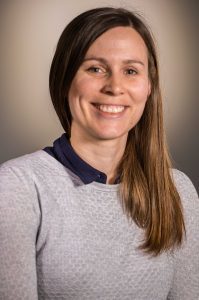 Marianne Nerland is a PhD candidate at the Faculty of Law, UiB
Marianne Nerland is a PhD candidate at the Faculty of Law, UiB


